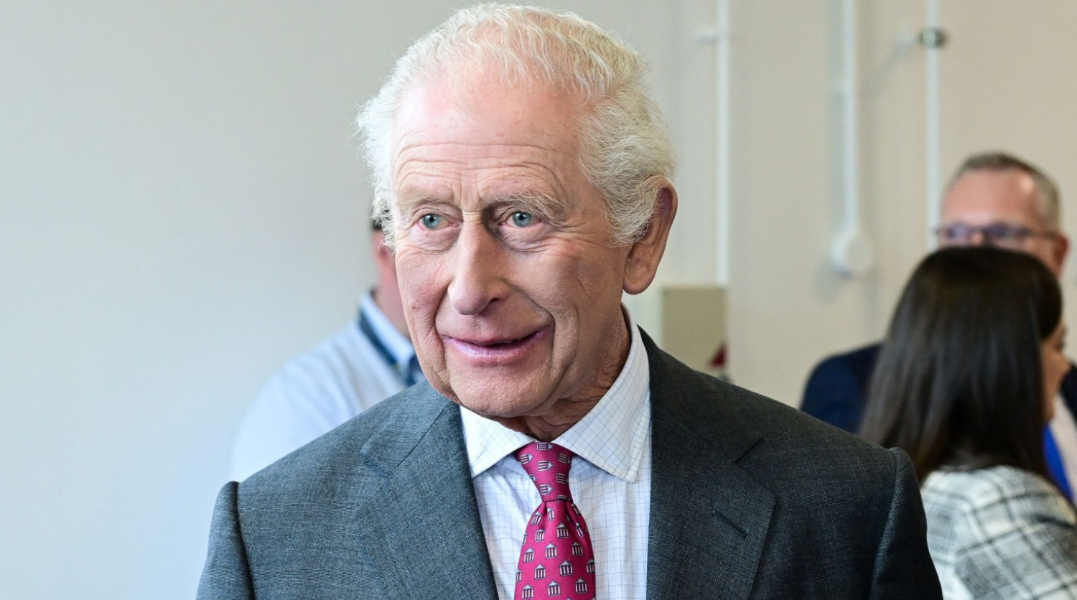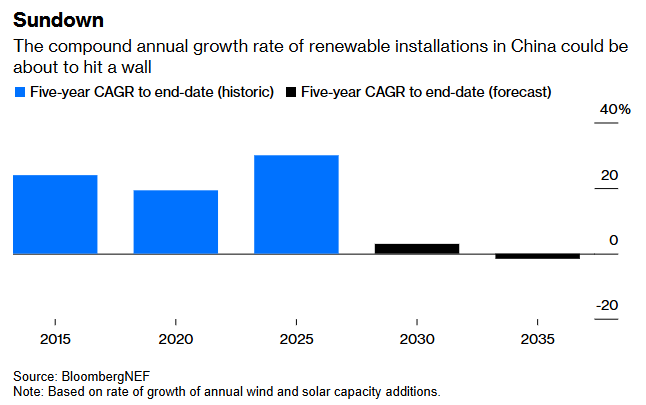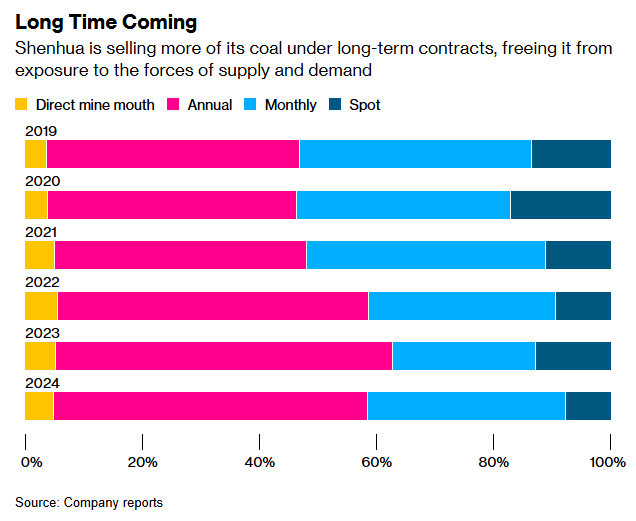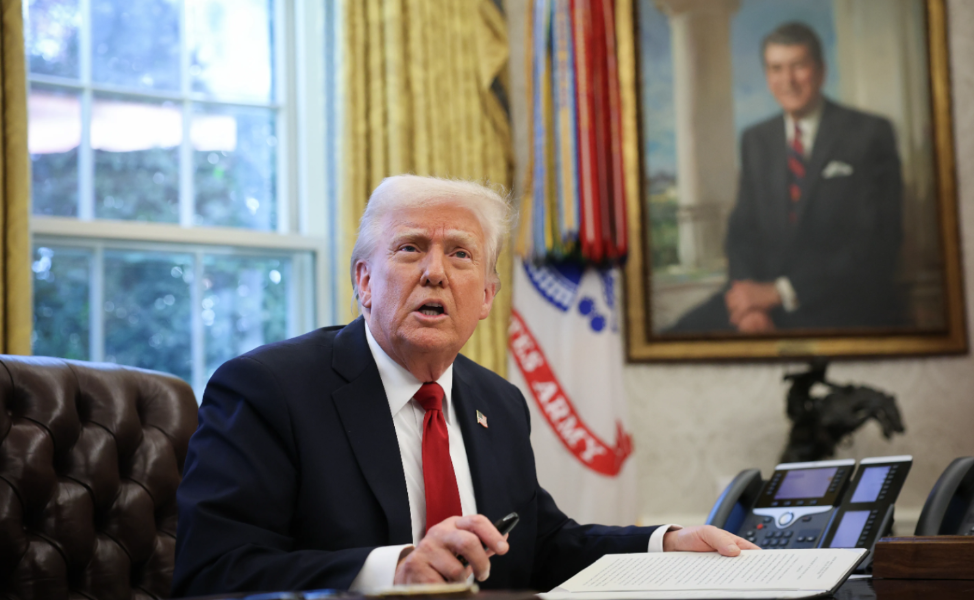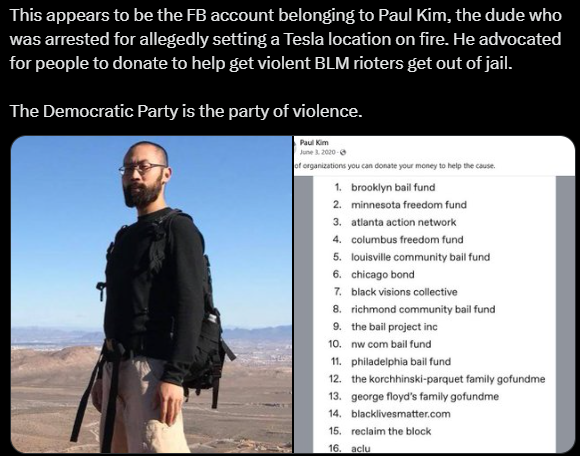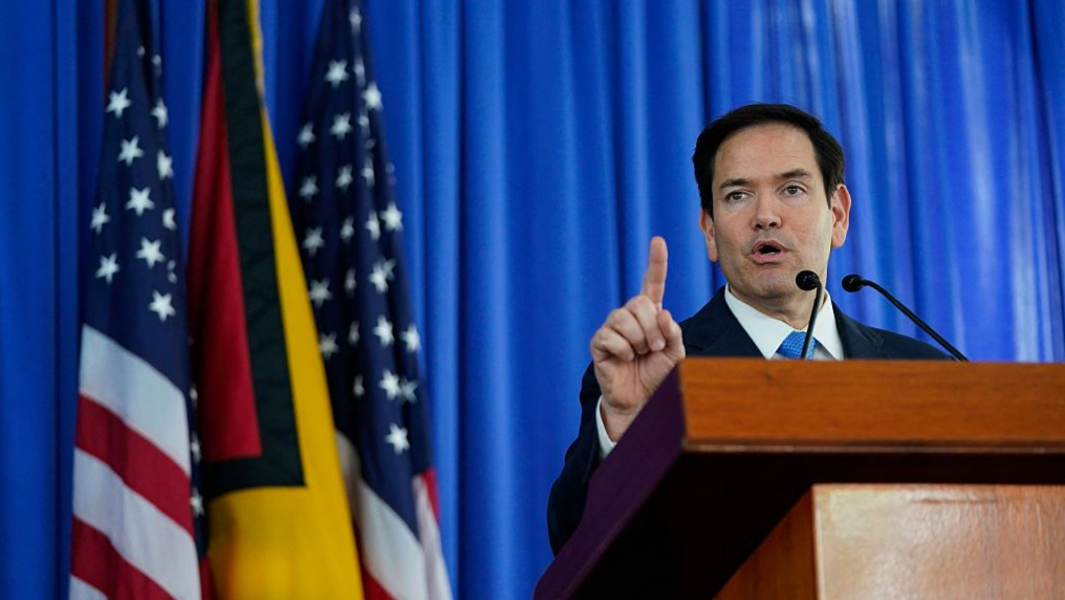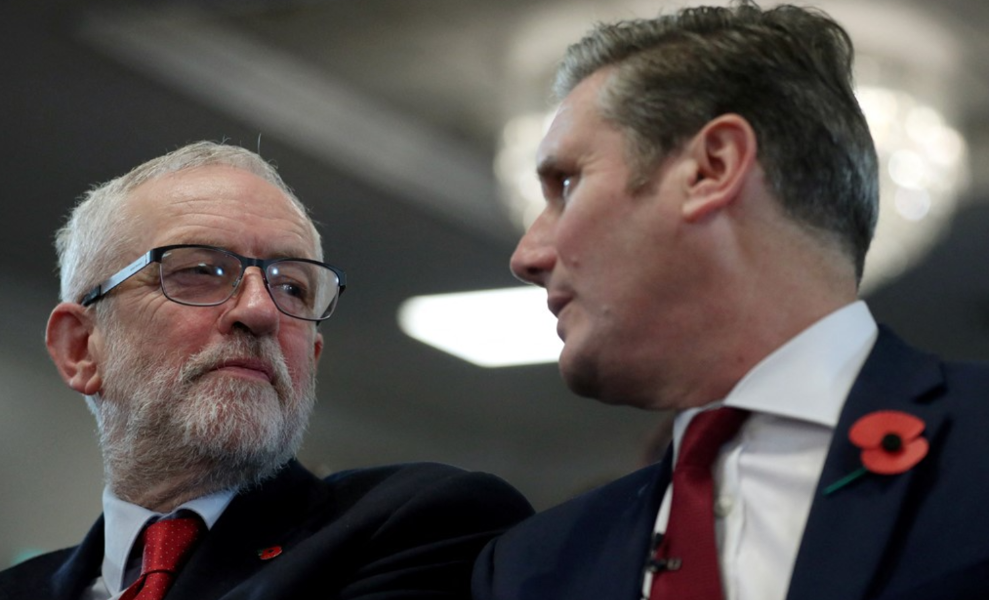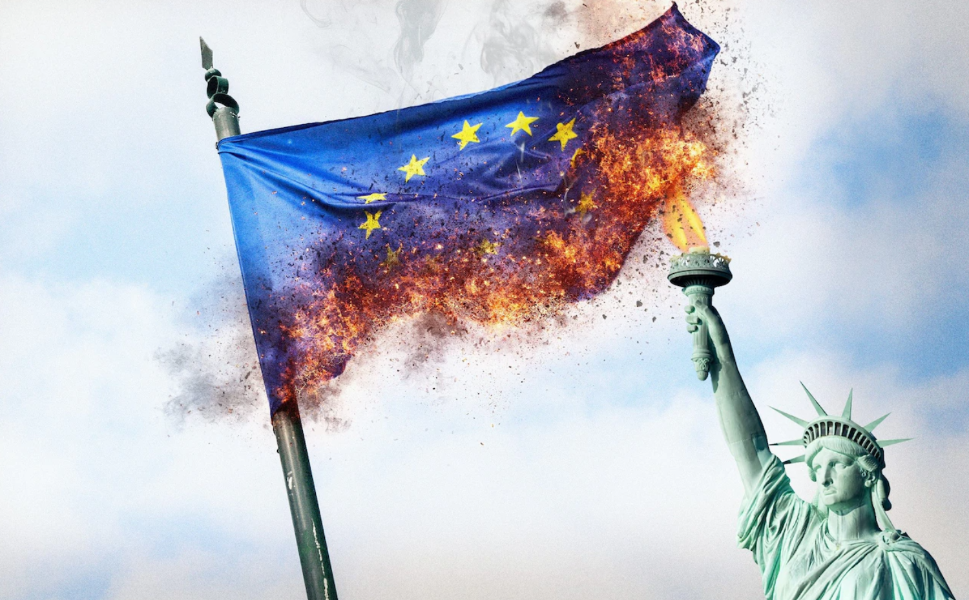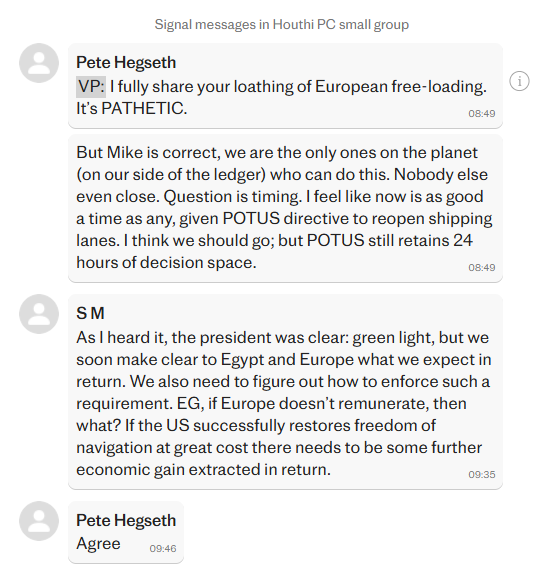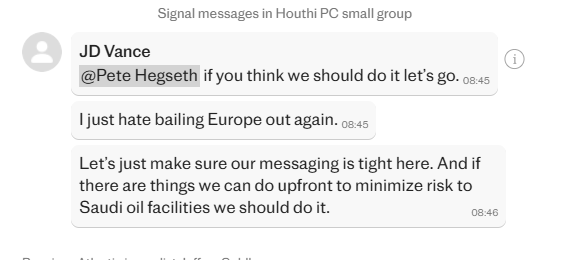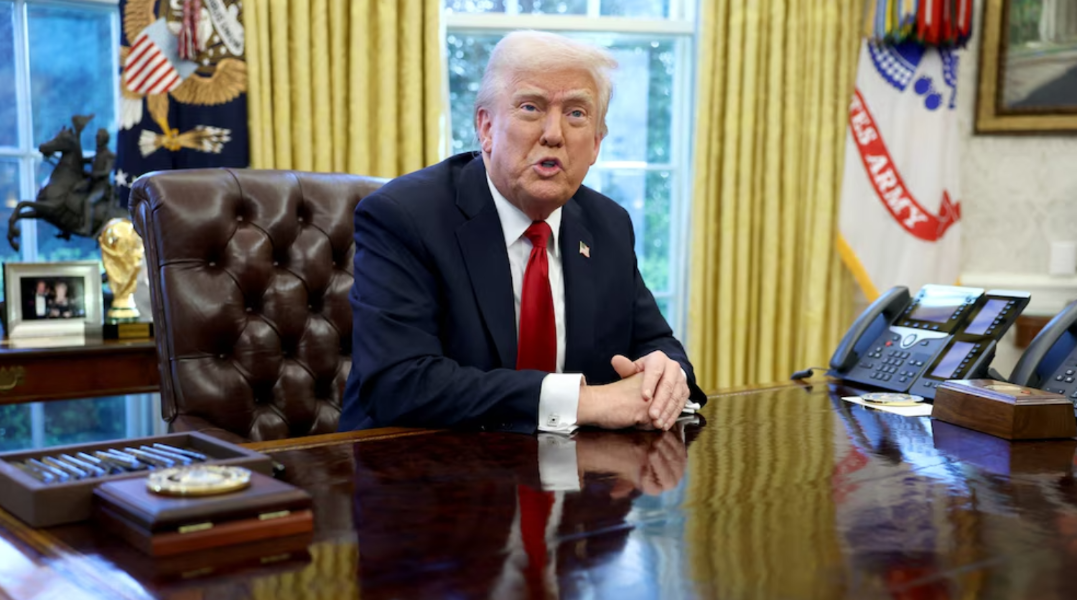-
Posts
9,974 -
Joined
-
Last visited
Content Type
Events
Forums
Downloads
Quizzes
Gallery
Blogs
Everything posted by Social Media
-

Rising Defiance: Armed Gaza Clans Call for Uprising Against Hamas
Social Media replied to Social Media's topic in World News
@thaibeachlovers enough of the inflammatory false claims please. This is a discussion thread not your trolling thread. -
King Charles has reaffirmed his support for a free press, calling it a "cornerstone of our democracy" in a statement issued ahead of a special Buckingham Palace reception for regional journalists across the UK. The King emphasized the essential role of local media, particularly in challenging times, as he and Queen Camilla prepared to welcome 400 guests from various news organizations in recognition of their contributions to journalism. “A free media is one that will and does make mistakes,” the King stated. “But at its best, it is a cornerstone of our democracy. It is in everyone’s interests that you should succeed. For without a thriving and financially robust regional media, we would all be the poorer.” Charles, an honorary life member of the London Press Club, reflected on a speech he gave in 2002 to mark 300 years since the first publication of Britain’s first daily national newspaper, the Daily Courant. He stressed that in an era when division is often highlighted, journalism plays an increasingly crucial role. “Two decades on, when too much focus is given to that which divides us, that role for your whole industry is more important than ever—and it starts from the ground up, at local level, in your hands,” he said. The King acknowledged the vital function of journalism in society, noting its ability to hold power to account and foster a sense of community. “Your reporting, and the work of all those who support you, helps amplify and reaffirm the rights and responsibilities we all share. It shines a light in dark corners, exposing injustice and wrongdoing. Above all, it helps strengthen our communities, in times of joy and at moments of sorrow.” Recognising the evolving media landscape, Charles commended regional outlets for adapting to new commercial and technological challenges. He highlighted the importance of engaging audiences through innovative approaches to ensure the survival of independent journalism. Queen Camilla, a longstanding supporter of journalists, is the patron of the Journalists’ Charity and the Guild of St Bride’s, the historic Fleet Street church known as the "journalists’ church." Based on a report by The Times 2025-03-28
-
New Sentencing Guidelines Could Allow Illegal Immigrants to Avoid Deportation Proposed sentencing guidelines from the Sentencing Council may lead to hundreds of illegal immigrants avoiding deportation each year by recommending more lenient prison terms than those set by parliamentary law. The independent body has drafted its first-ever sentencing guidelines for immigration offences, but concerns have been raised over the disparity between the proposed sentence lengths and the maximum penalties established by UK law. Under the draft guidance, judges would be advised to hand down sentences of less than 12 months for four key immigration offences, even though the law allows for much longer sentences. This distinction is crucial because, under UK law, foreign nationals sentenced to more than 12 months in prison are eligible for deportation. The guidance, once finalised, will also instruct judges to consider an offender’s first offence as a mitigating factor, allowing for a further reduction in sentencing. Critics argue this is problematic, as many offenders would not have previously been in the UK. Robert Jenrick, the shadow justice secretary, has voiced strong opposition, warning that the proposed guidelines would severely undermine border enforcement by making it more difficult for the Home Office to deport individuals convicted of immigration offences. “The guidelines the Sentencing Council have drafted will blow a hole in border enforcement. Yet again they are acting in a way that disregards parliament’s will,” he said. Jenrick also pointed to previous controversies involving the council, including new “two-tier” sentencing guidelines that could result in more lenient sentences for criminals from minority groups. The offence of knowingly entering the UK without permission carries a maximum penalty of four years in prison, yet the Sentencing Council’s draft guidelines suggest judges start at just six months. For deception offences, such as using fraudulent means to enter or remain in the UK, the guidance proposes a starting point of nine months—less than half of the maximum two-year sentence outlined in UK law. Similarly, possession of false identity documents related to immigration carries a maximum penalty of ten years, but the council suggests a starting point of only nine months. The possession of false ID without a “reasonable excuse” currently has a maximum sentence of two years, yet the draft guidance recommends a starting point of just nine months. According to figures from the Sentencing Council’s consultation document, these sentencing recommendations would impact hundreds of individuals. The document, first published in March last year, was discussed in multiple meetings involving Ministry of Justice officials before the consultation closed in June. Until now, no formal sentencing guidelines had been issued for immigration offences, but recent legislative changes introduced by the Conservative government prompted the independent council to develop its recommendations. While ministers were able to provide input during the consultation process, the final decision remains with the Sentencing Council. The Nationality and Borders Act 2022 introduced stricter penalties for immigration offences, including potential life sentences for those found guilty of facilitating illegal entry into the UK. However, the Sentencing Council, which was established in 2010 to promote consistency and transparency in the judiciary, operates independently, though it reports to the Ministry of Justice. Shabana Mahmood, the justice secretary, has direct authority over the appointment of half of the council’s members, while her approval is required for the remaining members. Jenrick has renewed his calls for Mahmood to adopt legislation that would allow the government to override the council’s guidelines. He introduced a bill this month that would prevent the Sentencing Council from issuing new guidelines without the justice secretary’s approval while also granting ministers the power to amend existing guidance. “That’s why I brought forward a bill to restore ministerial oversight to the council, but shamefully Labour opposed it. The justice secretary has chosen to be powerless to stop madness like this and the two-tier sentencing rules,” he said. In response to the criticism, the Sentencing Council issued a statement clarifying that “these are draft guidelines which have not yet been published as definitive guidelines.” It further explained that “the draft guidelines for these offences proposed higher sentences for the most serious offending behaviour whilst maintaining current sentencing practice for less serious offending.” The council also noted that the guidelines were designed to ensure that sentences reflected the full range of offences, from minor infractions to the most severe, while still allowing judges and magistrates the discretion to go beyond the guidelines if necessary in the interests of justice. Based on a report by The Times 2025-03-28
-
The European Union has urged its citizens to prepare for potential crises by stockpiling enough essential supplies to sustain themselves for at least 72 hours. In newly released guidance, the European Commission emphasized the need for a shift in mindset, encouraging a culture of “preparedness” and “resilience” across the continent. The 18-page document highlights the growing risks Europe faces, pointing to Russia’s full-scale war in Ukraine, increasing geopolitical tensions, sabotage of critical infrastructure, and the rise of electronic warfare as key threats. The initiative from Brussels serves as a stark warning to member states about the serious security challenges confronting the bloc. European leaders have become increasingly vocal about the need for war readiness, particularly in response to the persistent threat posed by Russia. Additionally, tensions with the United States, particularly under the Trump administration, have heightened concerns. Disagreements over NATO contributions and military support for Ukraine have prompted European nations to reassess their own defense strategies and bolster their military preparedness. The European Preparedness Union Strategy calls on citizens to take practical steps to ensure they are ready for emergencies. It stresses that the first 72 hours of any crisis are the most critical and that civilians should be equipped to handle extreme disruptions independently. “In the case of extreme disruptions, the initial period is the most critical,” the document states, adding that fostering self-reliance and psychological resilience should be a priority. Beyond emergency stockpiling, the commission advocates for the inclusion of “preparedness” education in school curricula. This would include equipping students with skills to combat disinformation and resist information manipulation—issues that have gained prominence amid modern hybrid warfare tactics. “New realities require a new level of preparedness in Europe,” said Ursula von der Leyen, President of the European Commission. “Our citizens, our Member States, and our businesses need the right tools to act both to prevent crises and to react swiftly when a disaster hits.” The European Commission’s guidance follows moves by individual nations to update their contingency strategies. Germany, for example, revised its Framework Directive for Overall Defense in June last year, outlining specific measures to be taken in the event of a conflict in Europe. At the time, German Interior Minister Nancy Faeser justified the changes, stating they were necessary to strengthen the country’s defenses in response to Russian aggression. As European nations grapple with an evolving security landscape, the EU’s latest guidance underscores the need for vigilance and preparation, signaling a significant shift in the bloc’s approach to crisis management. Based on a report by CNN 2025-03-26
-
In an rare display of dissent, armed groups in Gaza have called for a mass uprising against Hamas, challenging the group’s authority for the second consecutive day. Protesters took to the streets demanding an end to the ongoing war and what they described as an end to years of oppression under Hamas rule. As anger mounted, hundreds of protesters gathered across multiple locations to demand Hamas’s removal and an immediate end to the war with Israel. Footage showed large crowds of men flooding the streets of Beit Lahia in northern Gaza, determined to make their voices heard. In Nuseirat, central Gaza, a demonstrator stood atop another’s shoulders, passionately leading chants against the ruling group. Further demonstrations took place in Gaza City’s Zeitoun neighborhood, while another video captured a heartbreaking moment where children chanted, “We don’t want to die.” These demonstrations carry significant weight, especially considering that Hamas has a long history of forcefully suppressing any dissent within the enclave. The fact that civilians felt emboldened enough to take to the streets for a second consecutive day underscores a growing frustration with Hamas’s governance. The protests erupted just over a week after Israel resumed military operations in Gaza following the collapse of a temporary ceasefire. Israeli Defense Minister Israel Katz reacted to the demonstrations by stating, “This is the only way to win the war,” implying that internal resistance to Hamas is crucial for its downfall. There has been speculation in Israel that by weakening Hamas’s control over food distribution and resources, rival factions might be encouraged to challenge its authority. The Gaza clans have historically had a complicated relationship with Hamas, marked by violent clashes—most notably in 2008 and at various points since. Although some clan members have ties to other militant organizations, including al-Qaeda, they are generally not classified as jihadist groups in the same way Hamas is. Amal Kloub, a 35-year-old resident of Shuja’iyya camp, where one of the protests took place, expressed the deep frustration felt by many. “Today, young people went out because they are tired of the ongoing war, negotiations, and political speeches that are indifferent to the citizens of Gaza. Hamas has been in power for nearly 20 years, and we have only experienced successive wars due to the blockade and occupation.” Shuja’iyya has long been a stronghold of the Hilles clan, though it remains unclear if they played an active role in Wednesday’s demonstrations. Samir Saud, a 25-year-old from the Nuseirat refugee camp, voiced his desire for political change, saying, “We want elections. I want to live the experience of elections. We want to change the exhausting and tragic reality and build our future. Gaza has been completely destroyed, and no one has benefited from the war except for destruction.” The statement issued by the southern Gaza clans ended with a clear and decisive demand: “Hamas must lift its hand from Gaza immediately and end this unjust siege imposed on us because of decisions that do not represent us.” As unrest continues to spread, these protests mark a pivotal moment in Gaza, potentially reshaping the region’s political landscape in the face of long-standing turmoil. Based on a report by The Telegraph 2025-03-28 Related Post: Gaza Residents Stage Rare Protests Against Hamas, Demand End to War
-

China Clean Energy Slowdown? Its not just America & Europe
Social Media posted a topic in World News
China’s Energy Paradox: How Fossil Fuels Still Dominate Despite Cheaper Renewables The global push for clean energy has been met with resistance in many parts of the world, but the most surprising opponent may be China itself. Despite leading the world in renewable energy installations, the country continues to prop up its fossil fuel industry, ensuring coal’s dominance even as wind and solar become more cost-effective. Last year, China was responsible for installing more than 60% of the world’s new renewable energy capacity, disrupting a market that has long been controlled by coal. However, rather than allowing the energy transition to play out naturally, China’s government—like its counterparts in the U.S. and Europe—has taken steps to protect established fossil fuel interests. The result is a system where coal power remains deeply entrenched, despite the fact that it is now cheaper to build a wind or solar plant than it is to purchase the coal needed to fuel an existing power station. Counterintuitively, the number of new coal generators that began construction in China last year reached its highest level since 2015, even as the economic logic of fossil fuel power continues to collapse. The driving force behind this paradox is not market demand, but government intervention. Since a series of power shortages in 2021, Beijing has implemented a growing web of regulations designed to shield coal from competition. One of the key measures has been a shift to long-term contracts for coal power, locking in revenue for miners years in advance. This system discourages power providers from switching to renewables since they are already committed to paying for coal-fired electricity. Financial reports from China Shenhua Energy Co., the country’s largest coal miner, reflect this shift. The share of coal sold through these guaranteed contracts has risen more than 10 percentage points since 2021, ensuring that fossil fuel power remains financially viable even as renewable alternatives undercut its costs. Another tool keeping coal afloat is capacity payments, which compensate fossil fuel plants for remaining on standby in case of fluctuations in renewable energy production. While many energy markets use such payments, China’s are particularly generous. Since last year, coal plants have been able to recover 30% of their capital costs through these payments, a figure that will rise to 50% next year. These costs are passed on to consumers through their electricity bills. The impact is clear: Huaneng Power International Inc., China’s largest publicly listed power generator, has managed to increase electricity tariffs by 14% since 2021, even while reducing the share of fossil fuels in its energy mix. As a result, its profit margin—after accounting for non-fuel costs—has jumped from 31% to 47% in just four years. In simple terms, burning coal is now more profitable than ever, despite the availability of cheaper and cleaner energy sources. At the same time, renewables are being left to navigate an increasingly unforgiving market. Government subsidies for wind and solar were eliminated in 2021, meaning that these energy sources now receive the same benchmark prices as coal. That change alone did not derail China’s clean energy transition, but new policies announced last month could have a far greater impact. Under the new rules, new renewable energy projects will be required to enter reverse auctions—similar to systems used in Europe, the U.S., and India—where they must offer electricity at prices lower than the coal benchmark. This move could dramatically reduce profits for renewable developers, forcing them to accept ever-decreasing returns in order to secure contracts. While renewable energy’s lower fundamental costs should make it the clear winner in an open market, China’s regulatory environment is anything but open. Wind and solar developers are being forced to endure volatile market conditions, while coal plants enjoy the protection of state-backed pricing mechanisms. The consequences could be severe. Analyst David Fishman from the Lantau Group predicts that new renewable installations will “almost definitely” decline this year. The China Photovoltaic Industry Association forecasts that solar installations could fall by as much as 23%, with the worst-case scenario suggesting that capacity might not recover to 2023 levels until 2029. BloombergNEF estimates that while pre-existing projects may keep the market stable for now, growth will plummet, with a projected 3% compound growth rate for the latter half of the decade—a stark contrast to the 30% annual growth seen since 2020. The optimistic view of the energy transition is that the cost advantages of renewables will ultimately win out. The pessimistic view is that entrenched industries have the power to shape regulations in their favor, delaying or even reversing progress. China’s power grid, responsible for roughly 15% of the world’s total emissions, is about to test which of these perspectives holds true. The implications are alarming: No matter how strong a player is, if enough obstacles are placed in its way, it will eventually stumble. The coming years will determine whether China’s renewable energy industry can overcome these hurdles—or whether coal will continue to rule despite the economic logic against it. Based on a report by Bloomberg 2025-03-28 -
A 12-year-old Austrian girl was subjected to a horrifying gang-rape ordeal at the hands of at least a dozen migrant boys who taped their abuse and passed her around like a 'trophy', it has emerged. Named in local media as Mia, the young girl was reportedly subject to several sex attacks from a number of boys between February and June 2023 in garages, at perpetrators’ apartments and other locations in Vienna. Austrian police said on March 1, 2024, that they were investigating 17 people, most of them minors, on suspicion of sexually abusing the 12-year-old girl. They included Austrian, Turkish, Syrian, Italian, Bulgarian and Serbian nationals. Twelve of the suspects were minors between the ages of 14 and 18, one was 19, and two were below the age of criminal responsibility, which is 14 in Austria, and the identities of two others were unknown, said Florian Finda, a senior official with Vienna’s state criminal police office. But now, the 18-year-old boyfriend of the girl has become the first perpetrator to be convicted in a case which has shocked the Austrian capital. Afghan migrant, Wais S, appeared in Vienna Regional Court on Monday to face trial over the serious sexual abuse of the minor. He was 15-years-old at the time of the gang rape incident which reportedly took place in a hostel room in Vienna. According to German newspaper Bild, Wais knew that the young girl, who has been given the name Mia by local media, was under the age of 14 at the time of the attack in 2023, and had impregnated her. 'I plead partially guilty,' the defendant testified during the trial. 'I thought if she was 12 and I was 15, it was allowed.' During the trial, the teenager also admitted to blackmailing his young girlfriend after the abortion of their child with self-made videos of them having sex. 'She cheated on me at ski camp. I had bought her a ring with my last money because I loved her so much. She gave it back to me because she was afraid I would publish the videos,' he said in court, according to the German newspaper. An expert who analysed Wais S.'s mobile phone during the case disturbingly stumbled across a post on the TikTok channel 'ExposingVienna'. 'It's about public shaming and revenge porn,' he said. 'It looks like something was published. The defendant wrote: "She gangbanged 15 guys, posts videos, do you want videos, hahahaha?"' The mother of the now 14-year-old girl, told media: 'He acted as a savior, but in fact he alienated our daughter from us'. In a harrowing report from Austria's largest newspaper Kronen Zeitung, the schoolgirl was allegedly passed around among the teenagers like a 'trophy'. Footage of the abuse saw the girl yelling: 'Stop it', several times. But Wais' latest testimony strikingly contradicted the one he supplied on October 30, 2023. He reportedly said at the time: 'You have to imagine, she was 12, a little girl who was defenseless against several guys between the ages of 14 and 19'. The judge sentenced Wais to 15 months probation and £670 in damages. This has become the first conviction in the chilling case, after investigators from the Vienna State Criminal Police Office stormed a number of apartments and temporarily arrested 17 suspects in February 2024. Based on a report by Daily Mail 2025-03-28
-
An investigation has uncovered a massive fraud scheme in the UK’s university system, where thousands of students are enrolling in degree courses with no real intention of studying. Instead, they are exploiting the student loan system to claim financial aid, defrauding taxpayers of potentially hundreds of millions of pounds. The investigation, conducted by The Sunday Times, has revealed a widespread issue where students—many of them Romanian nationals—are enrolling in courses solely to secure loans that they never intend to repay. Government officials suspect that an organized network is behind the recruitment of these fraudulent students. The majority of these suspected fraudulent applications are linked to franchised universities—small colleges that offer degree courses on behalf of established universities but often have lower academic entry requirements. Reports indicate that at least six franchised providers have been identified as being involved in such fraudulent claims. A review of leaked financial documents, company accounts, and testimonies from sources within the Student Loans Company (SLC), the Department for Education (DfE), and the Office for Students (OfS) has revealed some shocking details. In the 2022/23 academic year alone, the SLC identified 3,563 suspicious loan applications, totaling almost £60 million. However, internal documents seen by The Sunday Times suggest that the true scale of fraud could run into the hundreds of millions. Investigations have shown that some franchised colleges accept students who lack basic English proficiency, with some applicants even submitting screenshots of Duolingo test results as proof of their language skills. At some universities working with franchised providers, Romanian nationals accounted for between 35% and 55% of applicants last year. Disturbingly, some students enroll in a course, collect their first £4,000 maintenance loan payment, then drop out—only to re-enroll the following year and repeat the process. One franchised college reportedly made £234 million in revenue last year and saw its profits surge by an astonishing 1,266% over three years. These figures suggest that the fraud is not limited to individual students but could be a systematic operation benefiting both institutions and recruiters. Education Secretary Bridget Phillipson, writing for The Sunday Times, described the revelations as "one of the biggest financial scandals in the history of our universities sector." She has announced that the Public Sector Fraud Authority, under the Cabinet Office and the Treasury, will be tasked with investigating the abuse of the student loan system. The scale of the issue is staggering, with UK student loan debt currently standing at £236 billion and projected to reach £500 billion by the 2040s. While the lead universities, overseen by the OfS, are responsible for awarding qualifications and maintaining academic standards, franchised providers deliver the teaching. Students enrolled in franchised programs can access government funding through the SLC, which distributes £20 billion annually in loans and grants. This growing crisis has been fueled by social media recruitment tactics. Unlike traditional university applications that require A-levels, personal statements, and interviews, franchised providers offer a different route. Recruitment agents—essentially commission-based salespeople—advertise these courses aggressively on TikTok, Instagram, and Facebook. Posts often promise easy university admission and full student finance, sometimes even offering free laptops as incentives. One recruitment post reads, "Your journey to studying in the UK begins here!" while another urges prospective students to "Apply now as spaces will go quick!" Another agent explicitly targets non-English speakers, stating: "You don’t know English, but you want to enter university in the UK?" A Romanian commenter under the post claims, "That’s how it goes in the UK. I barely know two words, and I’m passing because they take money and we take it." Another remark reveals the shocking reality: "I have an example in my class—he doesn’t know how to write or read in English. So it’s possible!" Once accepted onto a franchised course, students can apply for tuition fees and maintenance loans through the lead university. Tuition loans go directly to the lead university, which then pays a share to the franchised provider and the recruitment agent. The maintenance loan—up to £13,700 a year depending on circumstances—is deposited directly into students' bank accounts. Repayment is required only when a graduate earns over £25,000 per year. If they never reach this threshold, the debt is written off after 40 years. The system relies on proper monitoring of student attendance to prevent fraud, but concerns have been raised that both franchised providers and lead universities are failing in this duty. "The problem with attendance is proving it and what does attendance mean?" said a senior OfS source. The lack of a clear definition makes it difficult to identify fraudulent claims effectively. Vivienne Stern, chief executive of Universities UK, has stated: "Universities UK, and its members, are clear about the need to uphold high standards in the management of franchise partnerships. If there is evidence of fraudulent behavior, we completely agree that it must be rooted out." As the government steps up its investigation, the question remains: how did this level of fraud go unchecked for so long, and what measures will be put in place to prevent further abuse of the system? Based on a report by The Times 2025-03-28
-
With Donald Trump no longer at the top of the ticket, cracks are beginning to appear in the once-dominant MAGA coalition. As Democratic voters look to push back against what they see as years of "bullyism" under Trump, surprising upsets and Republican struggles are emerging across key races. The latest sign of trouble for Republicans came in Pennsylvania, where the GOP lost a state Senate seat in a district Trump carried by 15 points in November. A Democratic voter, speaking to the Associated Press, made her motivation clear: She was “tired of the bullyism” and wanted to “stick it” to Republicans. The concern for the GOP doesn’t stop there. In Florida, a state where Trump’s influence remains strong, Republicans are now nervous about Monday’s special House election. Their candidate in a district that Trump won by 30 points is underperforming, raising alarm bells about voter enthusiasm and turnout. Meanwhile, Wisconsin’s upcoming state Supreme Court race has seen an influx of support from both Trump and Elon Musk, yet polling suggests that MAGA voters aren’t as energized as they once were. Republicans have seen firsthand how bad candidates can sink MAGA’s electoral chances. Arizona’s Kari Lake and Georgia’s Herschel Walker both suffered disappointing defeats, and similar concerns are now surfacing in Florida. In the 6th District, GOP candidate Randy Fine is struggling, polling within the margin of error while being significantly out-fundraised. Florida Governor Ron DeSantis acknowledged the problem, stating, “It’s a reflection of the candidate running in that race.” However, not all GOP candidates are facing the same level of difficulty. In Florida’s deep-red 1st District, Republican Jimmy Patronis has been outspent but appears to be coasting to victory in a special election to replace former Rep. Matt Gaetz. For Democrats, even small victories are a big deal. After a series of high-profile losses, any sign that MAGA’s grip is loosening is a morale boost and a potential signal for larger shifts in future elections. For Republicans, these struggles raise a pressing question: Without Trump himself on the ballot, can the MAGA movement still hold its ground? Based on a report by AXIOS 2025-03-28
-

Teslas torched with Molotov cocktails and shot with gun
Social Media replied to Social Media's topic in World News
UPDATE: Suspect Arrested in Molotov Attack on Tesla Dealership in Las Vegas -
A Las Vegas man has been arrested in connection with a violent attack on a local Tesla dealership that authorities say had “the hallmarks of terrorism.” Paul Hyon Kim, 36, was taken into custody on Wednesday by the Las Vegas Metropolitan Police Department, with assistance from the FBI, a week after multiple Teslas were set on fire in a dramatic act of destruction caught on camera. At least three vehicles were consumed by flames after being targeted with Molotov cocktails at the Tesla Collision Center. The situation escalated when one of the cars’ lithium batteries exploded, intensifying the blaze. Investigators also discovered that several vehicles had been vandalized with broken windows, and the word “RESIST” was spray-painted in red at the scene. Kim, a cinematographer based in Las Vegas, has expressed support for pro-Palestinian causes on social media, according to his online presence. Authorities linked him to the crime through DNA evidence recovered at the scene. Surveillance footage allegedly captured Kim using a rifle to destroy security cameras in the vicinity before turning the weapon on the Teslas and then setting them ablaze with Molotov cocktails. License plate readers tracked a vehicle registered to Kim near the Tesla center before the attack. The same car was seen speeding away from the scene shortly after the incident, according to KLAS reports. During a search of Kim’s home, police uncovered multiple firearms and gun parts. The FBI emphasized the significance of the coordinated effort in apprehending the suspect. “It’s nothing short of exemplary,” said Special Agent in Charge Spencer Evans. “The seamless collaboration you see to keep the community safe here in southern Nevada is unparalleled.” Kim has been charged with 15 counts, including destruction of property, arson, and possession of a fire device, according to the Las Vegas Review-Journal. This attack is the latest in a series of incidents targeting Tesla vehicles, dealerships, and charging stations, often tied to opposition against the company’s owner, Elon Musk. “There’s nothing courageous or noble about firebombing private property and terrorizing your local community,” Special Agent Evans said. “The self-righteous mob that’s cheering you on today to commit acts of violence on their behalf will leave you high and dry and forget about you tomorrow.” Based on a report by NYP | X 2025-03-28 Related Posts: Teslas torched with Molotov cocktails and shot with gun
-
King Charles has been forced to cancel a series of engagements after a brief hospital visit due to side effects from his ongoing cancer treatment. Despite the setback, the 76-year-old monarch returned to Clarence House, where he resumed work as usual. Sources close to the King described the hospital visit as a “most minor bump in a road that’s very much heading in the right direction.” To ensure his continued recovery remains on track, engagements scheduled for Birmingham have been canceled. However, insiders emphasized that there was “no drama” surrounding the visit and that it was simply part of his treatment process. “As many can vouch, such things are not unexpected with these kinds of conditions,” a source said. Buckingham Palace released a statement confirming the situation: “Following scheduled and ongoing medical treatment for cancer this morning, The King experienced temporary side effects that required a short period of observation in hospital. His Majesty’s afternoon engagements were therefore postponed. His Majesty has now returned to Clarence House, and as a precautionary measure, acting on medical advice, tomorrow’s diary programme will also be rescheduled. His Majesty would like to send his apologies to all those who may be inconvenienced or disappointed as a result.” The King has been open about his diagnosis while maintaining his medical privacy. Though no further details on the side effects were provided, they are understood to be temporary and not uncommon for patients undergoing similar treatments. King Charles spent the evening at Clarence House, where he was described as being in “good form.” He continued working on state matters, reviewing documents and making calls from his study. The hospital visit took place at the London Clinic, where he had previously received care. He traveled to and from the facility by car as usual, without Queen Camilla accompanying him. A spokesman addressed the postponements, stating, “His Majesty was due to receive Credentials from the Ambassadors of three different nations this afternoon. Tomorrow, he was due to undertake four public engagements in Birmingham and is greatly disappointed to be missing them on this occasion. He very much hopes that they can be rescheduled in due course and offers his deepest apologies to all those who had worked so hard to make the planned visit possible.” Buckingham Palace has indicated that no further updates are expected as this is not considered a major development. However, minor adjustments may be made to next week’s schedule as needed. The decision to announce the changes later in the day was due to the need for consultation with his medical team and staff regarding whether the engagements should go ahead. Despite his illness, King Charles has maintained a demanding schedule, continuing his royal duties while undergoing treatment. His diagnosis was publicly announced in February, and though the specific type of cancer has not been disclosed, it was confirmed that it was unrelated to the prostate surgery he underwent in January. It was also previously revealed that the cancer was caught at an early stage. Since returning to public duties in April, the King has participated in high-profile events, including the D-Day commemorations in France, hosting state visits for the Emperor of Japan and the Emir of Qatar, and an extensive tour of Australia and Samoa with Queen Camilla—all while receiving outpatient cancer treatment. While his schedule remains largely intact, there may be slight adjustments to prioritize his continued recovery, particularly in preparation for an upcoming state visit to Italy in just over a week. Queen Camilla has previously expressed her frustration that her husband refuses to slow down, but sources insist that his schedule is managed in close consultation with his medical team to ensure his health remains the top priority. “The reaction of any patient to medical treatment can be unpredictable, and it makes sense to make minor adjustments as necessary,” one insider said. Those close to the King believe that maintaining his public and state duties has been beneficial to his overall well-being. He remains deeply appreciative of the support, encouragement, and kind words from the many people he has met throughout his engagements. Based on a report by Daily Mail 2025-03-28
-
- 1
-

-
US Secretary of State Marco Rubio announced that the United States has revoked at least 300 visas of foreign students as part of the Trump administration’s efforts to curb pro-Palestinian demonstrations on university campuses. "Maybe more than 300 at this point," Rubio said while speaking to reporters during a visit to Guyana. "We do it every day, every time I find one of these lunatics." Rubio was asked to confirm how many student visas had been canceled as part of the administration’s crackdown on rhetoric that it deems anti-Israel. His comments followed the arrest of Rumeysa Ozturk, a Turkish doctoral student at Tufts University, who was taken into custody by masked, plain-clothes officers outside her residence in Boston, Massachusetts. A video of the arrest, showing Ozturk being led to an unmarked car, quickly went viral, sparking protests online. Ozturk, a Fulbright Scholar on an F-1 student visa, is enrolled in a doctoral program for Child Study and Human Development at Tufts. When asked why her visa was revoked, Rubio responded, "Here's why: I've said it everywhere, and I'll say it again. If you apply for a student visa to come to the United States and you say you're coming not just to study, but to participate in movements that vandalize universities, harass students, take over buildings, and cause chaos, we're not giving you that visa." It remains unclear whether Ozturk has been formally charged with any crimes. Rubio did not specify the allegations against her but acknowledged that she had participated in pro-Palestinian protests. She also co-authored an opinion piece in the Tufts student newspaper last year, calling on the university to divest from companies linked to Israel and to recognize "Palestinian genocide." Ozturk’s lawyer, Mahsa Khanbabai, argued that her client’s arrest was politically motivated. "Based on patterns we are seeing across the country, her exercising her free speech rights appears to have played a role in her detention," Khanbabai told Reuters. This latest arrest is part of a broader trend of actions taken against international students who have expressed support for Palestine. Trump officials have cited the Immigration and Nationality Act as the legal basis for these deportations, arguing that it allows the State Department to remove non-citizens deemed "adversarial to the foreign policy and national security interests" of the US. The crackdown is in line with an executive order signed by President Donald Trump in January, aimed at combating what his administration has classified as antisemitism. Since then, the White House has revoked $400 million in federal funding for Columbia University over allegations that it failed to address antisemitism on its campus, and it has warned other universities of similar consequences. One of the most high-profile cases involves Mahmoud Khalil, a Palestinian activist and Columbia University graduate, who remains detained in a Louisiana facility without charges. Ozturk was also transported to a Louisiana detention center, despite a Massachusetts federal judge ordering her detention to take place in-state. The judge has given the government until Friday to provide more details on her arrest. US Homeland Security spokeswoman Tricia McLaughlin alleged that Ozturk "engaged in activities in support of Hamas, a foreign terrorist organization that relishes the killing of Americans." However, no formal charges have been announced against her. Senator Elizabeth Warren, a Democrat from Massachusetts, strongly criticized the arrest, calling it "the latest in an alarming pattern to stifle civil liberties." She added, "The Trump administration is targeting students with legal status and ripping people out of their communities without due process. This is an attack on our Constitution and basic freedoms – and we will push back." The administration has faced legal challenges over its actions. On Wednesday, a federal judge ordered the Trump administration to halt efforts to deport Yunseo Chung, a Columbia University student and legal permanent resident who immigrated to the US from South Korea as a child. Rubio defended the administration’s stance, stating, "The US gives students visas to earn a degree, not to become a social activist tearing up our campuses." He added, "If you lie, get the visa, and then engage in that kind of behavior once you're here, we're going to revoke it." Based on a report by BBC 2025-03-28 Related Topics: Lawsuit by Hostage Families Targets Campus Activists Over Alleged Support for Hamas A difference between free speech and persecuting Jews Democrats Face Backlash for Supporting Arrested Palestinian Activist Mahmoud Khalil Federal Education Department Investigates 60 Universities Over Antisemitism Allegations Trump’s Bold Stand Against Campus Antisemitism Sends a Clear Message Trump Border Czar: ICE Will ‘Absolutely’ Deport Legal Immigrants Trump Threatens to Cut Federal Funding Over Campus Protests U.S. State Dept to Use AI to Revoke Visas of Foreign Students with Alleged Ties to Hamas
- 109 replies
-
- 12
-

-

-

-

-

-
Six Russian tourists lost their lives on Thursday when a tourist submarine sank near the Egyptian resort city of Hurghada. Maj. Gen. Amr Hanafy confirmed the fatalities on the Red Sea Governorate’s official Facebook page, stating that 45 passengers were onboard at the time, including tourists from Russia, India, Norway, and Sweden, along with five Egyptian crew members. According to Hanafy, apart from the six Russians, all other tourists were successfully rescued. Inside the same Sinbad tourist submarine that sunk off the coast of Egypt in the Red Sea on Thursday morning. This video is from a previous voyage. It gives you a sense of the experience when things don’t go terribly wrong. The governor also noted that four individuals were critically injured and are currently receiving treatment in intensive care at local hospitals. The tragic accident occurred in the waters off Egypt’s eastern coastline and involved a vessel operated by Sindbad Submarines. According to the Russian consulate in Hurghada, the submarine "crashed at a distance of 1 km from the shore" at around 10 a.m. while conducting an underwater excursion to explore the coral reef. The consulate added that most passengers were rescued and taken to nearby hotels and hospitals for further care. Hanafy stated that "investigations by the authorities are underway with the vessel’s crew to determine the cause of the incident," emphasizing that the submarine had a valid operating license and its crew leader possessed the necessary "scientific certificates." In a video shared alongside the statement, Hanafy was seen visiting survivors in hospitals, where some were wrapped in emergency blankets while others remained in their hospital beds. Hurghada, located approximately 480 kilometers (300 miles) southeast of Cairo, is a popular tourist destination known for its Red Sea resorts and diving opportunities. Sindbad Submarines, the operator of the ill-fated vessel, describes itself as an experienced company specializing in underwater excursions. The company’s website states that its submarines are "engineered in Finland to sustain underwater pressure up to 75m, ensuring safety and reliability." It also claims that "oxygen masks are located overhead and life vests under the seats" to ensure passenger safety in emergencies. Sindbad Submarines operates two recreational submarines, each with the capacity to carry 44 passengers and two pilots. The vessels are designed with "sizable round viewing windows" for each passenger, allowing them to observe marine life at depths of up to 25 meters (82 feet) for approximately 40 minutes. The company promotes the experience as an opportunity to explore "500 meters of coral reef and its marine inhabitants" from a "spacious air-conditioned cabin" with "comfortable seats and personal TV monitors." The weather conditions at the time of the accident were reported to be favorable, with clear skies, light winds, and temperatures around 30 degrees Celsius (86 degrees Fahrenheit). Wind speeds were recorded at under 10 kph, according to CNN meteorologists. Egypt’s Ministry of Tourism and Antiquities has yet to comment on the incident. The country’s tourism industry is a vital sector of its economy, attracting millions of visitors annually. However, safety concerns have occasionally marred the industry’s reputation. In November, at least 16 people went missing after a tourist yacht sank in the Red Sea following warnings of rough seas. The exact cause of that incident remains unknown. As investigations continue into the submarine tragedy, questions remain about the circumstances that led to the vessel's sinking despite its reported safety measures. Based on a report by CNN 2025-03-28
-
A baiting post of another member and reply has been removed. Please do not use the report function to score points when you were the one responsible for baiting the reply.
-
The Left’s Obsession with Nazi Labels Reveals Their Political Desperation Politics is often described as a tough game, but lately, it seems like many Democrats don’t even understand the rules they’re supposed to be playing by. Instead of engaging in substantive debate, their go-to tactic has become a reckless and absurd strategy: labeling any and all opposition as Nazis. The left’s overuse of this accusation is not just hyperbole—it’s their favorite insult. Donald Trump has been compared to Hitler, Elon Musk has been branded a Nazi, and swastikas have even been painted on Teslas. The latest political infighting within the Democratic Party proves that their self-destructive tendencies are in full force, and Senate Minority Leader Chuck Schumer has become their newest target. Schumer, despite being one of the most loyal Democratic leaders, is under fire from the radical left for the simple act of keeping the government open rather than shutting it down in a show of opposition. The hard left, which now dictates party rules, sees his decision as a betrayal. Ezra Levin, a leader of the left-wing group Indivisible, declared, “He led the charge to wave the white flag of surrender.” But he made it clear that his group “has no intention of surrendering to Trump, Musk and congressional Republicans.” The pressure campaign against Schumer is further fueled by a memo from MoveOn, a far-left group funded by George Soros, which states that 90% of its members believe Democrats “should throw out the usual playbook and take aggressive action to combat the Trump administration.” The memo also claims that for most of its supporters, opposing Trump is more important than any specific policy stance. The message is clear: it doesn’t matter what Democrats stand for, as long as they stand against Trump. This blind opposition is part of why the Democratic Party has reached a dismal 29% favorability rating. Instead of reconnecting with voters, they continue to alienate them, showing a complete disconnect from reality. Even Schumer, once seen as a Democratic stronghold, is being treated like a traitor. Protesters have taken to demonstrating outside his home—an intimidation tactic usually reserved for Republicans. What makes this even more absurd is that Schumer has been anything but a Trump ally. He has supported virtually every major policy pushed by Joe Biden, including the costly Green New Deal initiatives that contributed to soaring inflation and the open-border policies that have resulted in an estimated 15 million illegal crossings, many involving hardened criminals. He was also one of Biden’s most vocal defenders, insisting that the president was mentally sharp long after it was obvious to the world that he was not. Schumer’s loyalty to the party even extended to international politics. As the highest-ranking Jewish elected official in American history, he went so far as to call for regime change in Israel during its war with Hamas, aligning himself with Democratic activists who wanted to exert control over Israeli policy. Despite all this, Schumer is still under siege from the left. He has dedicated his career to the Democratic Party, yet unless he submits to their every demand, he too risks being labeled a Nazi sympathizer. This reckless name-calling has become the left’s favorite smear. Turn on the news or browse social media, and it won’t take long to see the word "Nazi" thrown around as an insult aimed at Trump, Musk, or their supporters. The term has been cheapened by overuse, losing its historical weight and significance. Once, there was an unspoken understanding that likening political opponents to Nazis was not only ignorant but also diminished the true horrors of Hitler’s reign. That understanding has been discarded. If everything is Nazi-related, then nothing is. Hitler’s atrocities, including the Final Solution that led to the murder of six million Jews and a war that resulted in 50 million deaths, are being trivialized. Deporting violent criminals, for instance, is now enough to earn Trump the label of fascist—one step away from being a Nazi, according to leftist rhetoric. Even Judge Patricia Millett, sitting on the D.C. Court of Appeals, stooped to this absurdity, claiming that “Nazis got better treatment under the Alien Enemies Act” than Venezuelan gang members facing deportation. This level of historical distortion is not only irresponsible but dangerous. It reveals a disturbing trend where those who constantly cry "Nazi" are the ones exhibiting authoritarian tendencies themselves. The left’s activists, who eagerly deface public spaces with swastikas, seem far more fascinated with Nazi imagery than those they accuse. Their obsession isn’t rooted in history or morality—it’s projection. There is no evidence to suggest that Trump, Musk, or anyone in their circles harbors Nazi sympathies. The charge is a baseless fabrication. Meanwhile, it’s the radical left’s foot soldiers who seem to have an affinity for drawing swastikas, painting them on Teslas, statues, and buildings. This isn’t just irony—it’s a revealing glimpse into who truly harbors authoritarian impulses. Based on a report by NYP 2025-03-27
-
A striking shift in migration patterns has emerged as more migrants are now fleeing into Canada from the United States rather than attempting to cross southward. Sources told The Post that President Trump’s renewed crackdown on illegal immigration has led to a significant increase in northbound crossings, with migrants opting to "self-deport" rather than face the risk of being apprehended by U.S. immigration authorities. Homeland Security sources confirm that migrants are now running scared with Trump back in office. In a remote area of Washington state, border agents are seeing an average of five migrants illegally crossing into Canada each day. Even before the new administration fully took over, the numbers were already rising. Official data from the Royal Canadian Mounted Police shows that 40 migrants crossed illegally from Washington into British Columbia in January, while Border Patrol agents in the U.S. recorded 30 crossings in the opposite direction during the same period. Many of those now heading north had initially entered the U.S. from Mexico and had obtained some form of temporary status while awaiting court decisions on their immigration cases. However, fearing that their cases may not be ruled in their favor, they are making desperate attempts to reach Canada before U.S. authorities can detain and deport them. “They technically have some sort of status as of right now, and the agents do know they’re intending to cross illegally into Canada,” said a source. “But they’re also trying to get out of the United States to avoid any immigration consequences that may happen if their case isn’t adjudicated in their favor.” Even the most remote sections of the 5,500-mile-long U.S.-Canada border are now witnessing an increase in northbound migration. In Alberta, Canada, the Royal Canadian Mounted Police recently encountered nine migrants, including children, braving the harsh February winter to cross from the U.S. The New York Times reported that Canadian authorities have caught around 20 illegal migrants in Alberta this year, compared to just seven in the previous year. This trend marks a dramatic reversal from the situation under the Biden administration, during which record numbers of migrants surged illegally into the U.S. from Canada. Federal data shows that roughly 23,700 illegal migrants were apprehended crossing from Canada into the U.S. last fiscal year, a massive jump from the 2,200 recorded in 2022. However, these figures still pale in comparison to the more than one million illegal crossings at the U.S.-Mexico border last year. In response, the Trump administration has placed pressure on Canada to bolster its border security, warning that failure to address the rising migrant flow and illicit fentanyl smuggling could result in 25% tariffs. In turn, Canadian border authorities have intensified efforts to crack down on fraudulent asylum claims and have taken steps to prevent migrants from exploiting lax visa policies. Canada has pledged $900 million to strengthen its border security efforts, including the acquisition of two Black Hawk helicopters and drones. Additionally, visa restrictions have been tightened to close loopholes that previously allowed migrants to fly into Canada before attempting to cross illegally into the U.S. As both countries step up their enforcement measures, the shifting migration dynamics signal a new era in border security, with Canada now becoming an increasingly sought-after refuge for those seeking to avoid U.S. immigration consequences. Based on a report by NYP 2025-03-27
-
Jeremy Corbyn Slams Starmer's Government, Calls Spending Cuts a 'Disgrace' Former Labour leader Jeremy Corbyn has fiercely criticized Prime Minister Keir Starmer’s government over proposed spending cuts, describing them as a "disgrace" and an "enormous disappointment." Corbyn, now an independent MP, led the Labour Party in a vastly different direction compared to Starmer, who once served in his shadow cabinet before making a concerted effort to distance himself from his former leader. During a discussion with Sophy Ridge, Corbyn took aim at Starmer's plans to slash the benefits bill by £5 billion annually, arguing that such measures unfairly target the most vulnerable in society. Starmer has defended the cuts by asserting that too many people are out of work and the welfare budget has become unsustainable. However, Corbyn strongly disagreed, saying the decision would take money away from "the very poorest disabled people in our society," likening it to the era of austerity policies. He warned that the tightening of eligibility criteria for personal independence payments would not only leave recipients struggling but would also place a heavier burden on families, particularly women, who would be forced to give up employment to care for their loved ones. "Who's it going to be?" Corbyn asked. "Usually women and families, who will give up jobs in order to care for somebody. There's already wholly disproportionate levels of poverty among families. The poverty is appalling." Corbyn’s scathing remarks highlight growing tensions over the government's economic policies, with critics arguing that the cuts will only deepen hardship for those already struggling. Starmer’s approach has been met with resistance from some within the Labour movement who fear it signals a retreat from the party’s traditional commitment to social welfare. Based on a report by Sky News 2025-03-27
-
Inside the Trump White House’s Growing Resentment Toward Europe The recent leak of a White House Signal group chat was more than just an intelligence blunder—it revealed a deeper frustration within Donald Trump’s administration about what officials see as Europe’s chronic dependency on American military power. A stunning moment in the chat occurred when Vice President JD Vance hesitated as his colleagues, including Defense Secretary Pete Hegseth, National Security Adviser Mike Waltz, and CIA Director John Ratcliffe, debated striking Yemen’s Iran-backed Houthi rebels. Vance, messaging from an economics event in Michigan, voiced his reservations. “I think we are making a mistake,” he wrote. He pointed out that while only 3% of U.S. trade flows through the Suez Canal, Europe relies on it for 40% of its trade. He worried that the American public might not grasp the necessity of the strikes and questioned whether the president realized how inconsistent this was with his stance on Europe. Vance suggested waiting a month before moving forward. His resistance, however, was quickly countered by his colleagues, who reassured him while simultaneously taking aim at transatlantic allies. Hegseth, without hesitation, agreed with Vance’s underlying skepticism of Europe, writing, “I fully share your loathing of European freeloading. It’s PATHETIC.” White House Deputy Chief of Staff Stephen Miller reinforced the point, stating, “As I heard it, the president was clear: green light, but we soon make clear to Egypt and Europe what we expect in return.” In the end, Vance fell in line with the majority, but not before making his frustration clear. “I just hate bailing Europe out again,” he said. While the conversation shocked European officials, the underlying sentiment is nothing new. U.S. frustration with Europe’s defense spending has been a bipartisan issue for decades. As far back as the 1960s, President John F. Kennedy called out European allies for failing to meet their obligations. In 2011, Barack Obama’s Defense Secretary, Robert Gates, warned that NATO’s future was bleak unless its members increased their military spending. Both Trump and Joe Biden have continued to press the issue. Even before last year’s presidential election, British and European defense experts had anticipated that if Kamala Harris won, she too would echo similar frustrations, though in a more diplomatic manner. Trump has gone further than his predecessors, even threatening to withhold military aid from NATO members who fail to meet their financial commitments. That pressure has led to some European nations ramping up their defense budgets. Yet within Trump’s circle, Vance’s resentment toward Europe appears to go beyond just military spending. He sees European leaders not just as freeloaders but as an elite class disconnected from American values. Speaking at the Munich Security Conference in February, he stunned European officials with his scathing remarks: “If you’re running in fear of your own voters, there is nothing America can do for you—nor for that matter is there anything that you can do for the American people who elected me and elected President Trump.” Vance’s worldview has been shaped over years alongside a group of like-minded advisors, many of whom, like him, are veterans of the wars in Iraq and Afghanistan. They returned home disillusioned with American interventionism and now occupy key positions in the administration. In the leaked Signal chat, two names stood out: Andy Baker, a former foreign service officer and Vance’s national security adviser, and Dan Caldwell, an Iraq War veteran with ties to both Hegseth and Vance. Caldwell has been a leading advocate for a doctrine of “restraint,” which rejects both Reagan-era peace-through-strength policies and Obama-style global engagement. This hardline stance has alienated even some of Trump’s natural allies. Nigel Farage, a longtime Trump supporter, was particularly angered when Vance seemed to dismiss Britain as a “random country that has not fought a war in 30 or 40 years.” Although Vance later denied the comment, Farage was blunt in his assessment. “I was angry about that,” he said. “The Republican party as a whole is—well, it’s America first. I mean, that’s what they feel, and that’s what they believe, and they think Europe’s been taking the mickey out of it for 60 years.” However, Farage noted that Vance’s background might make him even less sympathetic to Europe than Trump himself. “I’ve never known JD to be anti-British,” he said, “but he is less pro-British than Donald Trump.” This growing rift between the U.S. and its European allies raises questions about the future of transatlantic relations. If Trump’s administration views Europe as an unreliable partner, the continent may have to prepare for a future where American military and economic support is no longer a guarantee. Based on a report by The Telegraph 2025-03-27
-
Rep. Maxine Waters made controversial remarks over the weekend, suggesting that former President Donald Trump should deport his wife, Melania Trump, while criticizing his administration’s stance on birthright citizenship. Her comments, made during a protest against the Department of Government Efficiency’s (DOGE) cost-cutting initiative in Los Angeles, quickly sparked debate. During her speech, Waters attacked Trump’s efforts to challenge birthright citizenship, referencing Melania Trump’s immigration background. “When he [Trump] talks about birthright, and he’s going to undo the fact that the Constitution allows those who are born here, even if the parents are undocumented, they have a right to stay in America, if he wants to start looking so closely to find those who were born here and their parents were undocumented, maybe he ought to first look at Melania,” Waters said. “We don’t know whether or not her parents were documented. And maybe we better just take a look.” Melania Trump, however, was born in Slovenia in 1970, making her ineligible for birthright citizenship under the U.S. Constitution. She moved to New York City in 1996 on a travel visa before securing an H1-B visa to work legally as a model. She later obtained U.S. citizenship in 2006 after marrying Donald Trump. Notably, she became the first naturalized U.S. citizen to serve as First Lady and the second foreign-born First Lady in American history, following Louisa Adams, the wife of John Quincy Adams, who was born in England. Melania Trump also sponsored her parents’ citizenship, which they obtained in 2018. Her mother, Amalija Knavs, passed away in January 2024. Waters’ remarks seemed to misunderstand the meaning of birthright citizenship, which is granted under the 14th Amendment to individuals born on U.S. soil. The amendment states, “All persons born or naturalized in the United States, and subject to the jurisdiction thereof, are citizens of the United States and of the State wherein they reside.” This provision does not apply to Melania Trump, as she was born outside the U.S. Trump and his supporters have argued that the original intent of the 14th Amendment was to grant citizenship to formerly enslaved individuals and should not apply to modern immigrants who enter the U.S. illegally. In January, Trump signed an executive order ending birthright citizenship for children of undocumented immigrants, arguing that the policy has incentivized illegal immigration. Waters, known for her strong opposition to Trump, continued her criticism, referencing tech billionaire Elon Musk. “We are here because we are not going to let Trump, we’re not going to let Elon Musk, his co-president, or anybody else take the United States Constitution down,” she declared to the crowd. Waters has built a reputation as one of Trump’s fiercest critics, gaining national recognition for urging liberals to confront members of his administration during his first term. Her latest speech, however, drew scrutiny for its factual inaccuracies and personal attack on the former First Lady. Based on a report by BBC 2025-03-26
-
Is Labour inching toward a version of Donald Trump’s “drill, baby, drill,” or is the party still caught in a cycle of policy indecision? A fresh wave of confusion has emerged as Scottish Labour leader Anas Sarwar appears to advocate for “new oil and gas” while the party insists there has been no shift from Ed Miliband’s ban on developing new fields. Sarwar’s remarks have raised eyebrows, particularly as he called for the use of “new oil and gas” to reduce reliance on costly imports—an argument backed by industry experts who claim that tapping into fresh reserves could supply nearly half of Britain’s energy for the next 25 years. The timing is notable, given reports suggesting that developing new fields could inject a staggering £150 billion into the UK economy. However, Labour sources were quick to clarify that there has been no official deviation from Miliband’s policy. According to the party, Sarwar’s mention of “new oil and gas” was not a call for fresh drilling but rather a reference to maximizing output from existing fields. His comments followed a push from Offshore Energies UK (OEUK), the body representing the oil and gas industry, which has urged Labour to reconsider its stance. OEUK argues that reversing Miliband’s ban on new drilling could unlock at least three billion additional barrels of oil from UK waters, bringing total North Sea reserves to seven billion barrels—almost half of the 15 billion needed to sustain Britain’s energy supply until 2050. Sarwar, who has previously clashed with Labour leadership over energy policy and welfare issues, stopped short of outright opposing the current ban. Instead, he emphasized the urgent need to “maximize our existing resources,” stating: “The choice is more expensive imports from despotic regimes like Russia or new oil and gas, then the answer must be oil and gas.” He framed this as a critical moment for Britain, adding: “This is a generation-defining moment, we must rise to it to deliver the security and prosperity our country needs.” David Whitehouse, chief executive of OEUK, echoed the sentiment, acknowledging that the UK is on a path toward net zero but arguing that “we will need oil and gas for decades to come. It makes sense for the UK to produce as much as it can itself.” The industry, however, remains frustrated by Labour’s reluctance to embrace new drilling. Many fear that sticking to the current policy leaves Britain dependent on expensive imports, including from the US. Critics also argue that relying on foreign oil and gas is environmentally counterproductive, as North Sea energy production is significantly cleaner. With a Scottish Parliament election just over a year away and increasing pressure on net zero commitments, Labour’s current stance may not hold for long. Even the SNP, now free from Nicola Sturgeon’s Green-influenced policies, has adopted a more flexible approach, promising to judge new field applications “on their merits.” As the debate rages on, Scottish Tory leader Russell Findlay made his party’s position clear: “We are in favour of using all of the country’s resources.” For now, Labour continues to walk a fine line, caught between its green commitments and the growing economic and political pressure to secure domestic energy supplies. The real question is whether the party’s policy will evolve—or whether it will continue to straddle the line between drilling and dodging. Based on a report by The Telegraph 2025-03-27
-
World Athletics has announced a groundbreaking move to implement genetic testing for all female track and field athletes, a decision that could significantly impact gender eligibility rules in Olympic sports. The announcement was made by World Athletics President Sebastian Coe during a council meeting at the World Indoor Championships in Bangalore, India. Under this new policy, female athletes will be required to undergo a one-time cotton swab or dried blood spot test before being allowed to compete in World Athletics events. Coe confirmed that the organization is in the process of identifying a provider to handle the testing program. The issue of gender eligibility has been at the center of Olympic debates in recent years, especially as more transgender athletes have competed in high-profile events and as increased scrutiny has been placed on female athletes with differences in sex development (DSD). The discussion intensified during the Paris Olympics when officials from a banned boxing organization alleged, without evidence, that two female competitors had male XY chromosomes. The International Olympic Committee (IOC) has so far refrained from implementing a universal policy on transgender and DSD athletes, opting instead to leave such decisions to individual sports federations. Additionally, the IOC has historically opposed genetic testing, arguing that it is dehumanizing. However, the controversy surrounding gender eligibility at the Paris Games has heightened pressure on the IOC to establish a definitive stance on the matter. Most candidates in the recent IOC presidential election, including Coe himself, have pushed for a clear policy on gender eligibility. Newly elected IOC President Kirsty Coventry has stated her intention to form a task force to explore potential guidelines regarding transgender and DSD athletes. Coe defended the necessity of World Athletics’ new testing plan, emphasizing that it is about protecting the integrity of female competition. "This we feel is a really important way of providing confidence and maintaining the absolute focus on the integrity of competition," he stated. "It’s pretty clear testing will be for athletes to compete in the female category. The process is very straightforward, frankly very clear, and it’s an important one." Coe has a history of making bold and sometimes controversial policy decisions within the Olympic community. He spearheaded World Athletics' initial ban on transgender athletes from female categories in 2023 and made headlines again by introducing a financial reward of $50,000 for Olympic gold medalists. The latest announcement is yet another move that challenges the IOC’s current stance on gender policies. The testing program is set to be implemented in time for the World Athletics Championships in Tokyo this September. As the sporting world reacts to this policy shift, the debate over gender eligibility in athletics is likely to continue, with World Athletics taking a definitive step toward reshaping the future of women’s sports. Based on a report by WP 2025-03-27
-
Labour MPs have voted against a proposed ban on the government purchasing solar panels with alleged ties to modern slavery, sparking criticism from Conservative politicians. The amendment, aimed at preventing Britain’s new publicly owned energy company, GB Energy, from buying products suspected to be made using forced labour, was put forward by peers concerned about human rights abuses in China’s Xinjiang region. China, which dominates the global solar panel supply chain, produces around 80% of the world’s panels. The Xinjiang region, where Uyghur Muslims have reportedly been subjected to forced labour and human rights abuses, is responsible for up to 40% of the world’s polysilicon, a key component in solar panels. Despite these concerns, Labour MPs, under the party whip, voted to reject the amendment, which would have prevented public money from funding any company associated with forced labour. The amendment was defeated by 314 votes to 198, with no Labour MPs breaking ranks to support it. However, several Labour MPs, including Rachael Maskell and Alex Sobel, abstained from the vote. The decision was met with strong opposition from Conservative MPs, who argued that Britain should take a harder stance against modern slavery in supply chains. Andrew Bowie, the Shadow Energy Secretary, highlighted the historical significance of the vote, stating, “It was on this day in 1807 that the Abolition of the Slave Trade Act received royal assent. And 218 years on, Labour MPs are going to be whipped to allow the state to directly fund imports of goods built by slave labour in China.” Bowie argued that the amendment was about protecting vulnerable people, particularly the Uyghur Muslims of Xinjiang, and ensuring that Britain's net zero ambitions were not achieved at the cost of human rights violations. Former Conservative Party leader Sir Iain Duncan Smith, who has been sanctioned by China, echoed these concerns. He declared, “Many in this House will not stop until the Government faces up to one thing and one thing only: not one life through modern slavery is worth a lower cost of a solar panel. And that should be an epitaph of this ridiculous position the Government is in.” Despite rejecting the amendment, ministers have insisted that steps will be taken to ensure more stringent procurement processes for GB Energy. This includes appointing a senior figure within the company to oversee ethical supply chains and requiring companies to conduct their own supply chain assessments. Energy Minister Michael Shanks reassured Parliament that “this government is absolutely committed to confronting and tackling modern slavery in energy supply chains.” He emphasized that GB Energy would take a leading role in ensuring transparency and ethical sourcing. A £200 million investment into GB Energy, announced last week, will fund the installation of solar panels on schools and NHS hospitals as part of the UK’s goal to achieve net zero electricity by 2030. While ministers insist that no materials in government-procured panels will come from forced labour, critics argue that stronger safeguards—similar to those in the United States—are necessary. In the U.S., goods from Xinjiang are presumed to be made using forced labour unless proven otherwise, resulting in an import ban. Matthew Pennycook, a housing minister, reiterated the government's stance, stating, “We need to see action across the whole of the energy industry and that’s why we’re working across government to tackle the issue of forced labour in supply chains.” When pressed on whether he could guarantee that materials would not be sourced from forced labour, he replied, “Absolutely.” A 2023 report from the Helena Kennedy Centre for International Justice at Sheffield Hallam University found overwhelming evidence that major solar panel manufacturers in Xinjiang have recruited and employed forced labourers. The study revealed that in 2020, China supplied 75% of the world’s solar-grade polysilicon, with nearly half of that production coming from the Uyghur region. Concerns over forced labour in supply chains are not limited to solar panels. In December, *The Telegraph* reported that tomato and pepper products sold in British supermarkets were secretly produced using forced labour in China, further fueling calls for stricter regulations. The rejection of the amendment has ignited a wider debate about ethical sourcing and the UK’s commitment to combating modern slavery. While ministers have pledged to address these concerns through improved procurement policies, critics argue that without a legal ban, there is still a risk that public funds could support unethical labour practices abroad. Based on a report by The Telegraph 2025-03-27
-
President Donald Trump announced on Wednesday a new plan to impose 25% tariffs on all imported cars, intensifying an ongoing global trade war just weeks after previous tariffs caused market turmoil and raised concerns about a possible recession. "I think our automobile industry will flourish like it hasn't before," Trump said. The newly announced tariffs will impact an industry that employs over a million workers in the United States and depends on a supply chain deeply connected to Mexico and Canada. Experts have previously warned that these tariffs could drive up car prices for American consumers. Earlier this month, Trump had already imposed 25% duties on a significant portion of U.S. auto imports from Mexico and Canada, though he later delayed some of those auto-related tariffs. White House press secretary Karoline Leavitt previewed the latest round of tariffs on Wednesday, leading to an immediate dip in U.S. stock markets. Following the announcement, the Dow Jones Industrial Average fell by 130 points, or 0.3%, while the S&P 500 declined 1.1%. The Nasdaq, which is heavily weighted toward technology stocks, dropped by 2%. The auto industry took a hit as well, with shares of Tesla, led by Trump advisor Elon Musk, closing down 5.5%, while General Motors saw a 3% decline. According to a Cato Institute analysis of data from the U.S. International Trade Commission, Canada and Mexico are the two largest suppliers of finished motor vehicles and car parts to the United States. In 2023, these two countries accounted for nearly $120 billion worth of U.S. motor vehicle imports, representing approximately 47% of all such imports for the year. A similar share of auto parts imports also came from Canada and Mexico, the analysis found. Trump’s latest tariffs come just days before he is expected to introduce a new wave of duties on April 2, a date he has referred to as "liberation day," signaling a major shift in U.S. trade policy. He has repeatedly stated that the new tariffs aim to establish reciprocal trade relationships. However, speaking at the White House on Monday, Trump suggested that the final rates might be adjusted based on the tariffs imposed on U.S. goods by other countries. "I may give a lot of countries breaks," Trump told reporters in the Oval Office. "I'm embarrassed to charge them what they've charged us." This latest move follows a series of tariffs Trump imposed earlier in March, including increased duties on Chinese imports, raising tariffs on goods from the country to 20%. Days later, he implemented sweeping tariffs on all aluminum and steel imports. These actions triggered retaliatory tariffs from China, the European Union, and Canada, fueling a trade war that has rattled financial markets and sparked fears of an economic downturn. Economists largely predict that tariffs will lead to higher prices for consumers, as importers typically transfer part of the tax burden to buyers. At a press conference in Washington, D.C., last Wednesday, Federal Reserve Chair Jerome Powell attributed a "good part" of recent inflation to the effects of tariffs. Based on a report by BBC 2025-03-27


